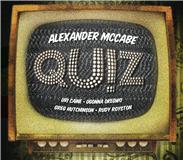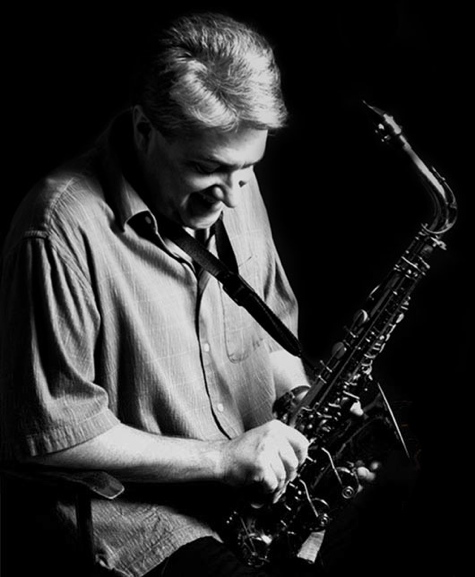 |
|
The Jazz Mann
thejazzmann.com
Quiz - Alexander McCabe
By Ian Mann |
Alexander McCabe is an alto saxophonist born in Boston, MA but now based in New York. He was born into a jazz loving household and was exposed to the music of the great saxophonists from an early age, among them Charlie Parker, Lester Young, Coleman Hawkins, Ben Webster, Sonny Rollins and John Coltrane. When the young McCabe took up the alto he later absorbed himself in the music of Cannonball Adderley, Jackie McLean and Eric Dolphy.
McCabe studied saxophone in Boston with George Garzone and Jerry Bergonzi before completing his musical education in New York. He has subsequently worked with George Coleman, Harold Mabern and Clifford Jordan as well as branching out into other areas of music including stints with Ray Charles and with the Chico O’Farrell Afro Cuban Big Band
. McCabe is also a member of the ska band Mephiskaphales and has also worked as a film soundtrack composer.
“Quiz” represents McCabe’s third jazz recording as a leader following 2001’s duo set “Manhattan Operations” recorded with pianist Joe Barbato, and the 2005 quartet album “The Round” featuring Barbato plus bassist Ugonna Okegwo and drummer Steve Johns.
For “Quiz” McCabe has assembled a heavyweight line up featuring pianist Uri Caine and drummer Rudy Royston from the Bill Frisell band. Okegwo remains on bass and drummer Greg Hutchinson takes over from Royston on two of the seven selections in a programme largely consisting of McCabe originals but also featuring the standards “Good Morning Heartache” and “How Little We Know”.
The album kicks off with “Weezie’s Waltz”, a charming dedication by McCabe to his young niece. As McCabe explains it isn’t a strict waltz at all as it varies between waltz time and 5/4. “It’s pretty and quirky” says McCabe, “sort of like my niece”. No arguments there as the saxophonist gently probes the harmonies and there’s a sparkling solo from Caine as the tune really starts to swing. There’s also a colourful drum feature for Royston with Okegwo anchoring it all together.
Hutchinson takes over the drum stool for the more forceful, hard bop influenced “Lonnegan”. Caine takes the first solo and again impresses with his inventiveness. McCabe follows him, his tone bigger and more incisive here, as befits the mood of the piece. Hutchinson and Okegwo impart suitably powerful propulsion and both enjoy solo features in a tune that unashamedly revels in some of the old fashioned jazz virtues.
The same line performs on the following “Kalido” which adopts a less frenetic mid tempo but explores broadly similar territory. McCabe’s solo is probing, Caine’s pithy, and again there are features for bass and drums with Hutchinson’s playing particularly colourful.
“Quiz” itself features some of McCabe’s most biting, garrulous McLean inspired playing on an energetic piece that barely lets up during it’s five minute duration. Caine’s solo is suitably sparkling, swinging and inventive and Royston demonstrates that he can do more than just play prettily.
A twelve minute exploration of “Good Morning Heartache” forms the album’s centrepiece. If the album thus far has been relatively mainstream or “straight-ahead” this takes the group into more exploratory territory, inspired perhaps by the music of John Coltrane. Early on McCabe’s brooding ruminations certainly owe something to Trane’s methods with Caine, Okegwo and Royston adequately filling the McCoy Tyner, Jimmy Garrison and Elvin Jones roles. After the “rolling thunder” intro the tune opens up into something a little more conventional but McCabe continues to stretch out with an astringent, probing solo. Caine then takes up the running with a typically imaginative solo that demonstrates a high level of musical intelligence whilst still continuing to swing. Okegwo’s pithy solo is his best of the set and the tune ends in the same meditative Coltrane-esque mood as it began. Despite Coltrane’s obvious influence this is still an impressive piece of work, a rigorous investigation of a well known standard that offers it a fresh slant and a new lease of life.
McCabe’s “St. Pat” is a sturdy piece of bop flavoured playing that begins with a tricky odd meter intro before settling down into a more straightforward blow. McCabe’s impassioned playing reveals the influence of the tenor masters he grew up on and Caine’s idiosyncratic solo sometimes hints at the style of Thelonious Monk. Okegwo weighs in with a lengthy solo, full of resonance, as Royston chatters around him. It’s all enjoyable, largely high octane stuff.
The standard “How Little We Know” closes the album, the highlight being a stunning solo from Caine propelled by Okegwo’s propulsive bass walk and Royston’s easily swinging drums. McCabe’s playing here is more tender than elsewhere but still not devoid of bite as the quartet begin in ballad mode, stretch things out and then wind down again. Royston’s drum breaks in the up tempo mid sections are also worthy of mention.
“Quiz” is an enjoyable album with some fine playing all round. Essentially it’s a straight ahead or mainstream date but McCabe adds enough “rogue” elements to make it interesting for both the musicians and the listener. There’s the varying time signatures of Weezy’s Waltz”and the weighty deconstruction of “Good Morning Heartache” for example, both acting as interesting contrasts to the more straight forward material.
There’s also McCabe’s sound, he’s a versatile musician who sometimes makes his alto sound more like a tenor and the breadth of his range serves the album well. Also it’s a pleasure to hear Caine in a relatively straight forward jazz context, a far remove from his more experimental works with the New York Downtown crowd or his jazz/classical mergers.
All in all then a pretty decent effort from McCabe. Let’s hope it’s not another five years before we hear from him as a leader again.
Back to Press page
|


